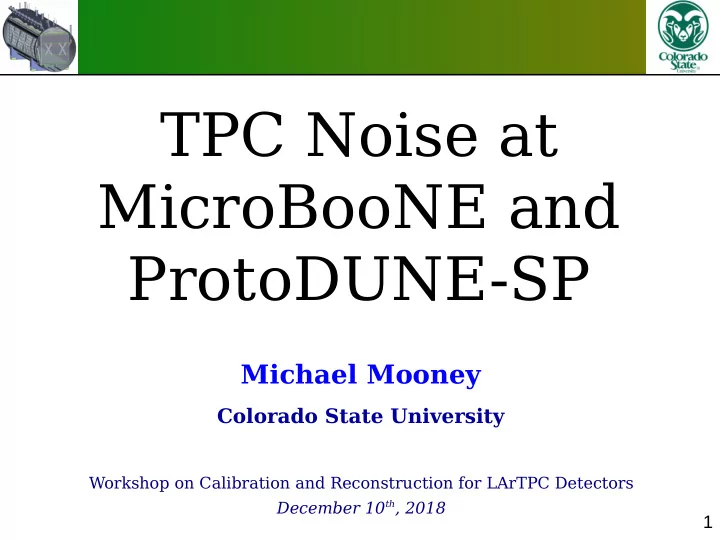

TPC Noise at MicroBooNE and ProtoDUNE-SP Michael Mooney Colorado State University Workshop on Calibration and Reconstruction for LArTPC Detectors December 10 th , 2018 1
Introduction Introduction ♦ TPC noise levels must be low enough to enable high enough S/N to accomplish physics goals • Impacts fjnding of signals and charge (energy) resolution • Relevant for DAQ/triggering (e.g. supernova/solar ν) ♦ Three large LArTPC detectors previously, or currently, operating: ICARUS, MicroBooNE, ProtoDUNE-SP • Also ArgoNeuT/LArIAT, 35-ton, 3x1x1, small test setups ♦ Focus of this talk: MicroBooNE and ProtoDUNE-SP • Front-end electronics very similar to SBND/DUNE design • Noise @ ICARUS not discussed in depth here, but: – New electronics paper: JINST 13 (2018) P12007 2
TPC Noise at MicroBooNE 3
MicroBooNE FE Electronics MicroBooNE FE Electronics μBooNE noise paper: JINST 12 (2017) P08003 ♦ Front-end (FE) electronics in LAr: BNL LArASIC-v4 • Lower noise levels in cold; also less input capacitance • See Brian Kirby’s talk for more information ♦ ADCs formed outside of LAr: ADC receiver boards attached to FEMs (Nevis Labs) in warm elec. crate 4
Turning On The Detector Turning On The Detector ♦ During commissioning, saw signs of “extrinsic” noise • Particularly bad on U/V (induction) planes ♦ Largely coherent across common electronics channels, so easily removed in software 5
Extrinsic Noise Sources Extrinsic Noise Sources ♦ Primary noise sources/fjxes: • Voltage regulator on ASIC LV power – change regulator on service boards (warm side of FT) • Cathode HV ripple – add second fjlter pot 6
Final Noise Levels Final Noise Levels ♦ After hardware fjxes, noise levels much improved ♦ Still small amount of residual external noise; fjltered out in software • Subtract median ADC value across channels on FEMB for each time tick • Does it bias extraction of charge from ionization signals? See later slide 7
Example Waveforms Example Waveforms U Plane – No Filtering U Plane – With Filtering ♦ On U/V planes, difgerence before and after noise fjltering (or hardware fjx) is stark! ♦ Addressing problems in hardware was important accomplishment of μBooNE, looking ahead to DUNE 8
Impact on Signal Charge Impact on Signal Charge ♦ Software noise fjltering technique uses “signal protection” to avoid deleting signals from tracks nearly parallel to anode plane • But signal must be “large”: > 5 times ENC ♦ Isolated signals (e.g. 39 Ar) and MIPs (> 16,000 e - ) are safe, but electron lifetime very high at MicroBooNE • Problems near cathode if lifetime lower at DUNE? 9
High-Frequency Noise High-Frequency Noise ♦ Another noise issue: high-frequency pick-up noise • Comes in bursts, with frequency content around 900 kHz • Low-pass fjlter in deconvolution completely removes • Worst at downstream end of detector, and on U/V planes • Endearingly (?) called “zig-zag noise” by MicroBooNErs 10
Cause of the Zig-Zags Cause of the Zig-Zags ♦ Increasing shaping time of FE ASICs leads to suppression of noise → noise upstream of ASICs • Evidence of noise pick-up on wires ♦ Largely mitigated by modifying grounding at laser- PMT hardware interlock chassis • Good grounding/shielding extremely important! 11
Signal-to-Noise Ratio Signal-to-Noise Ratio ♦ Peak Signal-to-Noise Ratio (PSNR) very high after software noise fjltering: > 15 for U/V , > 35 for Y • Includes angular correction to account for track-wire angle • Study uses cosmic tracks in data 12
TPC Noise at ProtoDUNE-SP 13
ProtoDUNE-SP FE Electronics ProtoDUNE-SP FE Electronics ♦ Similar FE ASIC to MicroBooNE • BNL LArASIC-v7 (v4 → v7) ♦ ProtoDUNE-SP also has ADCs in LAr (ADC ASIC on FEMB) 14
Data Event Display Data Event Display ♦ Without any software noise fjltering, event display looks very clean! ♦ Some very mild coherent noise, but manageable 15
Noise Levels in LAr Noise Levels in LAr ♦ Without any software noise fjltering, noise levels roughly 600 (700) e - ENC for Y (U/V) plane • Shown above: APA 3 (similar for other APAs) ♦ Expectations: 500 (600) e - ENC for Y (U/V) plane • First measurements very close to expectations 16
Raw Noise Spectra Raw Noise Spectra U Plane V Plane Y Plane Raw Raw Raw ♦ Noise spectra largely free of extrinsic noise • Small low-frequency bump, similar to MicroBooNE LV regulator issue (lower magnitude than at MicroBooNE) • Small spikes at higher frequencies are still being investigated • Difgerences between planes in white noise contribution at higher frequencies also still being understood ♦ Though little extrinsic noise, try software noise fjlter 17
Noise Filtering Results Noise Filtering Results U Plane V Plane Y Plane Raw Raw Raw U Plane V Plane Y Plane Filtered Filtered Filtered ♦ Most of extrinsic noise easily fjltered out in software 18
Modeling Noise Modeling Noise ♦ After software noise fjltering, noise spectrum in ProtoDUNE-SP data and MicroBooNE data very similar ♦ Plan: use data-driven spectrum and simulated pick-up noise to study impact on DUNE CP violation measurement ♦ More information on LArTPC noise modeling/simulation: • μBooNE noise paper: JINST 12 (2017) P08003 • μBooNE signal proc. paper #1: JINST 13 (2018) P07006 19
Summary Summary ♦ MicroBooNE and ProtoDUNE-SP paving the way for understanding TPC noise at SBN/DUNE • Also ICARUS (not reported in these slides), which uses difgerent front-end electronics (not in LAr) ♦ MicroBooNE observed a number of noise issues, addressed in hardware and software • Informed grounding, FE electronics designs for SBN/DUNE ♦ ProtoDUNE-SP observes very little extrinsic noise • Stay tuned for more results on electronics performance Summary of Expected Intrinsic Noise Levels at Difgerent LArTPC Detectors 20
BACKUP SLIDES 21
Noise in PD-SP Cold Box Noise in PD-SP Cold Box 22
Recommend
More recommend